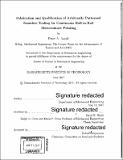Fabrication and qualification of arbitrarily patterned seamless tooling for continuous roll-to-roll microcontact printing
Author(s)
Ascoli, Peter A
DownloadFull printable version (56.31Mb)
Other Contributors
Massachusetts Institute of Technology. Department of Mechanical Engineering.
Advisor
David E. Hardt.
Terms of use
Metadata
Show full item recordAbstract
Microcontact printing is form of soft lithography utilizing an elastomeric stamp with a molded relief pattern to print features on substrates through ink transfer at micron and nanometer scales. This is a low-cost technique when compared with other printing and patterning processes. Traditional microcontact printing using flat stamps and planar, rigid substrates, which limit production output, manufacturing scale, and capital efficiency. However, a precise, scalable, roll-to-roll process could lower production costs, increase output, and enable the creation new technologies. Specifically, flexible displays, photovoltaic systems and accessories, and other large area electronics could be fabricated using a continuous roll-to-roll microcontact printing process. This work builds on existing research in fabricating seamless cylindrical PDMS stamps (tools) for microcontact printing using laser direct-write lithography for micro-patterning. Specifically, the scale-up requirement for microcontact printing to have arbitrarily patterned tools with diverse feature sets was addressed. The manufacturing process window of AZ 9260 photoresist was examined through numerical simulation and experimentation to determine an input set for the most robust performance and ideal tool feature geometry. A rasterscan protocol was developed to arbitrarily pattern the photoresist in a cylindrical setting. Additionally, non-destructive metrology equipment for analyzing the patterned photoresist and tool contact region were developed. Tools with multiple feature patterns were fabricated, and the evolution of critical feature dimensions were measured from simulation, to the photoresist mold, to the PDMS stamp, to the stamp in contact, and finally to the printed features. Manufacturing tools with diverse patterns was demonstrated, and the contribution of tool fabrication steps to ultimate print geometries was studied. The presented findings further the development of a scaled-up microcontact printing process in a continuous roll-to-roll setup.
Description
Thesis: S.M., Massachusetts Institute of Technology, Department of Mechanical Engineering, 2017. Cataloged from PDF version of thesis. Includes bibliographical references (pages 315-318).
Date issued
2017Department
Massachusetts Institute of Technology. Department of Mechanical EngineeringPublisher
Massachusetts Institute of Technology
Keywords
Mechanical Engineering.